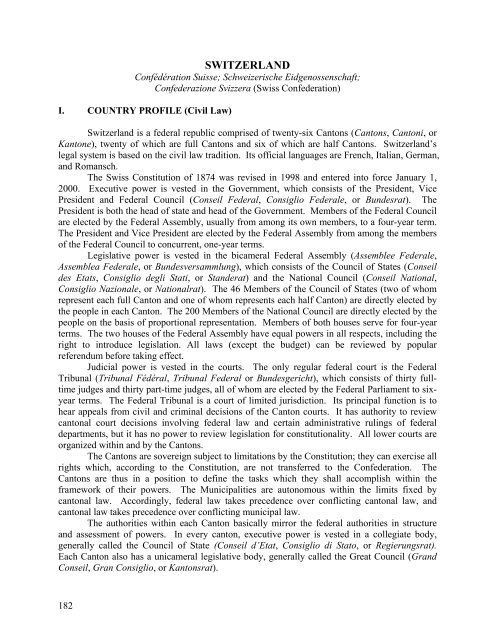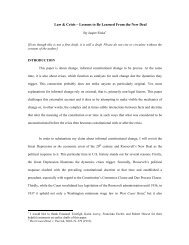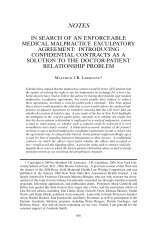Guide to Foreign and International Legal Citations - New York ...
Guide to Foreign and International Legal Citations - New York ...
Guide to Foreign and International Legal Citations - New York ...
You also want an ePaper? Increase the reach of your titles
YUMPU automatically turns print PDFs into web optimized ePapers that Google loves.
182<br />
SWITZERLAND<br />
Confédération Suisse; Schweizerische Eidgenossenschaft;<br />
Confederazione Svizzera (Swiss Confederation)<br />
I. COUNTRY PROFILE (Civil Law)<br />
Switzerl<strong>and</strong> is a federal republic comprised of twenty-six Can<strong>to</strong>ns (Can<strong>to</strong>ns, Can<strong>to</strong>ni, or<br />
Kan<strong>to</strong>ne), twenty of which are full Can<strong>to</strong>ns <strong>and</strong> six of which are half Can<strong>to</strong>ns. Switzerl<strong>and</strong>’s<br />
legal system is based on the civil law tradition. Its official languages are French, Italian, German,<br />
<strong>and</strong> Romansch.<br />
The Swiss Constitution of 1874 was revised in 1998 <strong>and</strong> entered in<strong>to</strong> force January 1,<br />
2000. Executive power is vested in the Government, which consists of the President, Vice<br />
President <strong>and</strong> Federal Council (Conseil Federal, Consiglio Federale, or Bundesrat). The<br />
President is both the head of state <strong>and</strong> head of the Government. Members of the Federal Council<br />
are elected by the Federal Assembly, usually from among its own members, <strong>to</strong> a four-year term.<br />
The President <strong>and</strong> Vice President are elected by the Federal Assembly from among the members<br />
of the Federal Council <strong>to</strong> concurrent, one-year terms.<br />
Legislative power is vested in the bicameral Federal Assembly (Assemblee Federale,<br />
Assemblea Federale, or Bundesversammlung), which consists of the Council of States (Conseil<br />
des Etats, Consiglio degli Stati, or St<strong>and</strong>erat) <strong>and</strong> the National Council (Conseil National,<br />
Consiglio Nazionale, or Nationalrat). The 46 Members of the Council of States (two of whom<br />
represent each full Can<strong>to</strong>n <strong>and</strong> one of whom represents each half Can<strong>to</strong>n) are directly elected by<br />
the people in each Can<strong>to</strong>n. The 200 Members of the National Council are directly elected by the<br />
people on the basis of proportional representation. Members of both houses serve for four-year<br />
terms. The two houses of the Federal Assembly have equal powers in all respects, including the<br />
right <strong>to</strong> introduce legislation. All laws (except the budget) can be reviewed by popular<br />
referendum before taking effect.<br />
Judicial power is vested in the courts. The only regular federal court is the Federal<br />
Tribunal (Tribunal Fédéral, Tribunal Federal or Bundesgericht), which consists of thirty fulltime<br />
judges <strong>and</strong> thirty part-time judges, all of whom are elected by the Federal Parliament <strong>to</strong> sixyear<br />
terms. The Federal Tribunal is a court of limited jurisdiction. Its principal function is <strong>to</strong><br />
hear appeals from civil <strong>and</strong> criminal decisions of the Can<strong>to</strong>n courts. It has authority <strong>to</strong> review<br />
can<strong>to</strong>nal court decisions involving federal law <strong>and</strong> certain administrative rulings of federal<br />
departments, but it has no power <strong>to</strong> review legislation for constitutionality. All lower courts are<br />
organized within <strong>and</strong> by the Can<strong>to</strong>ns.<br />
The Can<strong>to</strong>ns are sovereign subject <strong>to</strong> limitations by the Constitution; they can exercise all<br />
rights which, according <strong>to</strong> the Constitution, are not transferred <strong>to</strong> the Confederation. The<br />
Can<strong>to</strong>ns are thus in a position <strong>to</strong> define the tasks which they shall accomplish within the<br />
framework of their powers. The Municipalities are au<strong>to</strong>nomous within the limits fixed by<br />
can<strong>to</strong>nal law. Accordingly, federal law takes precedence over conflicting can<strong>to</strong>nal law, <strong>and</strong><br />
can<strong>to</strong>nal law takes precedence over conflicting municipal law.<br />
The authorities within each Can<strong>to</strong>n basically mirror the federal authorities in structure<br />
<strong>and</strong> assessment of powers. In every can<strong>to</strong>n, executive power is vested in a collegiate body,<br />
generally called the Council of State (Conseil d’Etat, Consiglio di Sta<strong>to</strong>, or Regierungsrat).<br />
Each Can<strong>to</strong>n also has a unicameral legislative body, generally called the Great Council (Gr<strong>and</strong><br />
Conseil, Gran Consiglio, or Kan<strong>to</strong>nsrat).
















